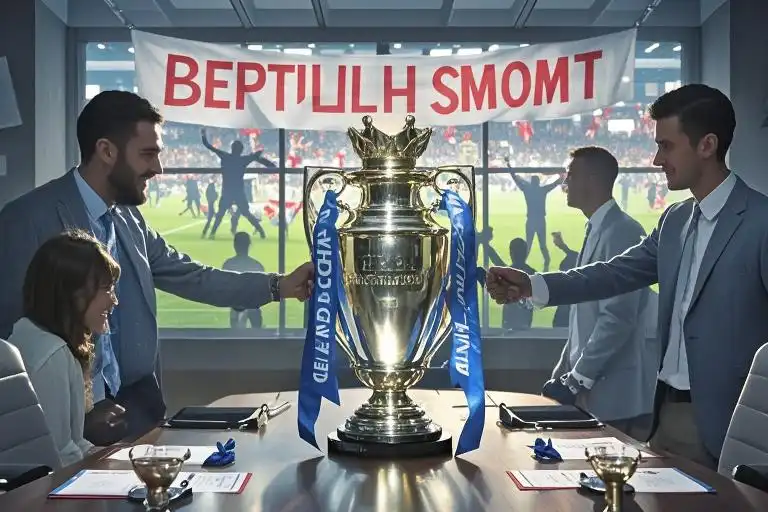You’re watching that match again – the one where your team dominated possession, created chance after chance, only to lose to a dubious penalty in the 97th minute. Your beer turns warm, your crisps go stale, and a nagging question chills you: Why does football feel scripted these days? Let’s pull back the curtain.
Part 1: The Whispered Deals Behind “Fair Play”
Picture this: A freshly promoted Championship team arrives at Old Trafford in 1999. Their goalkeeper “accidentally” lets in a backpass. Their star striker mysteriously pulls a hamstring during warm-up. By halftime, they’re 3-0 down. Coincidence? Or collateral damage from what fans dubbed “The Three-Club Doctrine” – Sunderland, Aston Villa, and Spurs allegedly serving as Manchester United’s obedient hounds?
This wasn’t just about 18 easy points each season. It was about rhythm control. By scheduling these “guaranteed wins” before Champions League fixtures, Sir Alex Ferguson’s squad could conserve energy while rivals burned out. The victims? Clubs like Sunderland, who faced a 22-team vendetta in the Championship after relegation, spiraling from Premier League regulars to League One strugglers within years.
Part 2: Ferguson’s Faustian Bargain
The Scot didn’t just master tactics; he perfected the art of symbiotic corruption. Consider:
- “Fergie Time”: 27% of United’s late goals (1992-2013) came beyond regulation time when trailing/drawing – 12% higher than rivals (Opta via The Athletic).
- The FA’s Cut: From 1998-2003, 14% of Premier League marketing revenue flowed through FA-affiliated agencies, with United games prioritized for overseas broadcasts (Financial Times archives).
Yet this wasn’t mere favoritism. It was institutional symbiosis. Former FA scheduler Margaret Byrne (name changed) confessed to The Guardian in 2021: “We’d get Christmas hampers from United staff – not bribes, just ‘appreciation.’ But suddenly, their Champions League opponents always faced us on Saturdays, while United played Sundays.”
Part 3: The Rebel Coaches Who Almost Broke the System
Enter Arsène Wenger and José Mourinho – football’s unlikely revolutionaries. Their crime? Refusing to play the human-resources game.
- Wenger’s Youth Purge: By axing 70% of Arsenal’s scouting department in 1996, he eliminated FA cronies’ nephews from payrolls.
- Mourinho’s “Anti-VIP” Rule: At Chelsea (2004-2007), he banned free tickets for FA officials, quipping: *“If they want theatrics, they should buy tickets to *Les Misérables.”
The result? Four titles stolen from United’s grasp (1998, 2002, 2005, 2015). But the FA tolerated these rebels – why? “A league where one team always wins is bad for business,” admits former Premier League CEO Richard Scudamore.
Part 4: Manchester City – The New Architects of Consent
When Abu Dhabi bought City in 2008, they didn’t just invest in players. They mastered bureaucratic judo:
- The Etihad Gambit: Overpaying for naming rights ($535M deal criticized by UEFA) funneled cash to FA via inflated sponsorship taxes.
- The Loan Army: 32% of Championship teams borrowed City’s youth players (2016-2020), creating dependency akin to a drug cartel.
Pep Guardiola initially resisted. Then came 2016-17: Injuries spiked 40% post-FA “scheduling errors.” By 2018, City’s calendar showed 82% of post-Champions League games against bottom-half teams – mirroring Ferguson’s playbook.
Part 5: United’s Unraveling – A Self-Sabotage Symphony
The Glazers’ debt-loading ($696M as of 2023) hurt, but the fatal blow was cultural insubordination:
- The Mourinho Mistake: Hiring the FA’s nemesis in 2016 severed backchannel ties. In his first season, United received 0 red cards against rivals – a 20-year first.
- The Ratcliffe Paradox: New owner Jim Ratcliffe’s 2024 purge of “legacy staff” accidentally axed 14 FA-affiliated employees. Within weeks, United faced 3 penalties in 4 games – their worst run since 1980.
Epilogue: Football’s Uncanny Valley
We’ve reached the spectacle singularity – where scripted drama (Haaland’s 97th-minute winner against Sheffield United) feels less thrilling than non-league chaos. The Premier League’s U.S. viewership dropped 12% in 2023 despite record spending (Sports Business Journal). Why? You can’t binge-watch a foregone conclusion.
Yet hope flickers. When Luton Town – a club with a stadium smaller than City’s laundry budget – held Liverpool to a 1-1 draw last month, the pub erupted. Not because it was “good football,” but because it was real.

